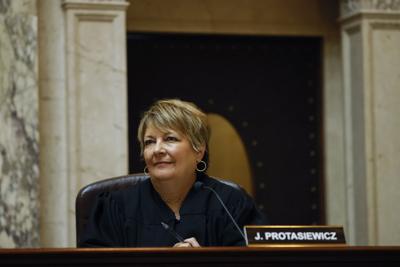Wisconsin Supreme Court Justice Janet Protasiewicz said Friday evening she would not recuse herself on a pair of cases targeting the state’s legislative maps before the high court, a move sure to draw ire from Republican lawmakers and potentially inflame talk of impeaching the justice.
Protasiewicz’s election to the state Supreme Court shook up the Wisconsin political world earlier this year, as it gave left-leaning justices a 4-3 majority on the court and signaled a potential new direction for the court on redistricting, abortion, voting rights and other matters.
GOP lawmakers, however, say Protasiewicz’s comments from her victorious campaign over conservative Dan Kelly mean she should recuse herself.
In a 48-page ruling released Friday evening, Protasiewicz rejected Republicans’ core arguments regarding recusal and said her “oath binds me to participate” in the case.
“In deciding this motion, I have searched the law books — and my conscience — to ensure a correct and impartial ruling,” she wrote. “I have reviewed the parties’ arguments. I have studied the facts. And I have examined every relevant precedent. Ultimately, I have found I must deny the recusal motion.”
In a separate decision, the court ruled 4-3 to take up one of the challenges to the legislative maps, with Protasiewicz joining her liberal colleagues on the court in the majority.
During the campaign, Protasiewicz told the Cap Times she would “enjoy taking a fresh look” at the redistricting question and later called the maps “rigged.”
She has denied that these comments prejudiced her from hearing the cases and told reporters at her swearing in that she was committed to “fairness and impartiality.”
Assembly Speaker Robin Vos, R-Rochester, has floated the possibility of impeaching Protasiewicz if she does not step aside.
Vos’ office did not immediately respond to a request for comment. He told WKOW earlier in the week that if Protasiewicz does not step aside, “the Legislature will take the appropriate actions to make sure that the laws are followed.”
Vos has sought the opinion of three conservative former Supreme Court justices on whether impeachment is warranted.
The Wisconsin Code of Judicial Conduct lists six criteria that might warrant recusal, though the ultimate decision is left up to the justice.
They include a judge serving in the case previously as a lawyer, if they have an economic interest in the case or if there is a personal bias against someone involved in the proceedings.
In legal filings earlier this month, parties on both sides of the redistricting cases sparred over whether Protasiewicz should recuse herself, particularly in light of a decision from the Commission on Judicial Conduct to dismiss complaints filed against the justice earlier this year.
Republicans have argued that roughly $10 million in campaign donations from the Democratic Party of Wisconsin to Protasiewicz’s campaign constitute an economic interest in the redistricting matter, though the party is not involved in either of the two cases.
In her ruling, however, Protasiewicz rejected that argument, pointing to other justices on the court who have heard redistricting cases, despite donations from political parties.
She conceded there could be instances where donations would warrant recusal but said this was not one of those times.
“It would turn precedent on its head, and confound the administration of this court, for justices to recuse whenever a possible outcome of a case could potentially be seen as beneficial to a non-party campaign supporter,” she wrote.
In supporting her decision, Protasiewicz pointed to comments from three conservatives in U.S. Supreme Court Justice Antonin Scalia, state Supreme Court Justice Rebecca Bradley and former state Supreme Court Justice David Prosser.
She also cited a 2004 U.S. Supreme Court case which held that judicial candidates can opine on disputed legal or political issues. And she referenced a more recent case involving a West Virginia judge who the nation’s highest court said should step aside because of campaign donations.
That case, Protasiewicz noted, involved a single donor effectively bankrolling a judge’s electoral victory, something she said did not happen with her campaign.
The DPW donations, she said, were “too small a percentage of my campaign committee’s fund, and too small a percentage of the overall spending on the race, to warrant my disqualification.
Two cases challenging the existing legislative maps were filed shortly after Protasiewicz took office.
One lawsuit currently pending before the courts was brought by the liberal-leaning law firm Law Forward and a group of state and national groups.
That case is the one the Supreme Court will take up. A second case, meanwhile, will not be heard.
Chief Justice Annette Ziegler argued against taking the case in a dissenting opinion, arguing the new case does not present new legal questions requiring the court’s input.
“Where does this cycle end?” Ziegler wrote. “Must this court also allow additional future parties to simply sit this litigation cycle out and come forward next court term—or after the next court election—and present already litigated claims again?”
The lawsuit seek new maps where all 132 state legislators would run in 2024, calling for special elections in some state Senate districts. 



